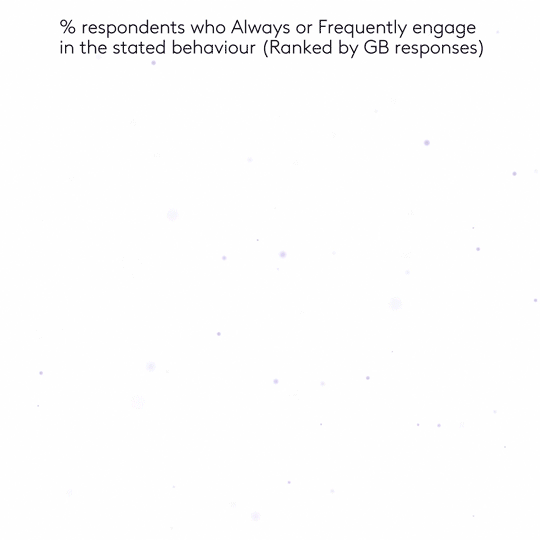In British homes, a quiet revolution brews in the kitchen — a concerted effort heralded by the soft hum of the freezer and the rustle of wonky vegetables in the shopping basket. This revolution isn't about flamboyance; hardly surprising as consumers emerge from many months of higher costs. Instead, it's characterised by savvy spending and a keener sense of sustainability.
The pandemic served as a catalyst for this shift. As an "invisible chef of change," it coaxed consumers into embracing larger, less frequent shopping trips, fundamentally altering purchasing patterns. Now, even as life normalises, the lessons remain ingrained, but how shoppers think about their choices is changing again as they adjust to ongoing cost of living pressures.
Conscious Kitchens
Data from Worldpanel by Kantar indicates a shift from the ephemerality of perishables to the dependability of frozen goods. The freezer, previously a repository for the sometimes overlooked, has become a tool against waste, aligning with demands for practicality without sacrificing pleasure.
Within this dynamic, the British consumer is not just seeking nutrition; they engineer a combination of flavour, ease, and thriftiness. The rise of frozen foods epitomises this trend, with meals that are both enjoyable and practical gaining favour. While taste is important, the practical attributes of being 'a treat, filling, quick, and easier' often clinch the decision. In other words, frozen indulgence and convenience can increasingly beat fresh equivalents.
Frozen Assets
It appears that frozen foods facilitate culinary pragmatism — consume what you need and preserve the rest. This dynamic also plays well with the nation's collective environmental conscience, where reducing food waste is increasingly on the radar. Concerns over food waste have escalated, a sentiment that didn't just emerge but surged from being the sixth most important concern in 2020 to third in 2023 (only behind Global Warming & Plastic Waste). In Ireland, the trend is tracking even higher, with 14.6% of shoppers expressing concern about food waste.
Retailers and manufacturers, who have been urging the UK government to revive plans for mandatory food waste reporting, also share consumer concerns over food waste.
But the perception of responsibility has also undergone a shift. A greater onus is placed on governments and manufacturers, with 36% of consumers now believing that the power to mitigate environmental damage lies predominantly with these larger entities, up from 20% five years ago. Again, the trend holds true in nearby Ireland where 42% of people say manufacturers have the biggest responsibility to limit environmental impact. This marks a call to action for the consumer goods industry, which consumers believe should bear a larger share of environmental stewardship.
Evergreen Eats
In response, retailers and manufacturers are innovating rapidly to align demands with product shelf lives. Almost nine out of ten households tell us they manage their food storage to extend its lifespan, a clear indicator of the high priority placed on minimising waste. With more consumers diligently checking 'best before' dates, industry players are motivated to create products that not only last longer but also contribute to a more sustainable food system.
British Behaviour

It’s within this climate that new product development thrives, focusing on longevity without sacrificing quality. From refrigeration techniques that prolong freshness to packaging that extends shelf life, manufacturers are stepping up. Products with extended shelf life are more common, and wonky vegetables — 23% cheaper on average — have found favour with cost-conscious consumers.
This convergence of consumer behaviour and industry innovation represents a significant step towards a more sustainable, cost-effective, and enjoyable way of eating and living.
The shift comes as we see more people concerned about food waste for the good of the planet, and for the good of their wallets. In many ways, it's about redefining value. In the United Kingdom, 78% of households report frequently repurposing leftovers into new meals, showcasing a national disposition towards efficiency.
But there are still areas for improvement. Shoppers in Scotland tell us they are still looking for better guidance on how to dispose of packaging to minimise waste. For Eco-actives there, 89% say they are “always looking to reduce waste.”
Power of the Palate
On the culinary front, Britain's meals reflect a balance of taste and economy. Cuisine-based dinners have seen an 8% rise since 2019, indicating a desire to recreate restaurant experiences at home. Simultaneously, there's a discernible shift towards meatless meals, indicating not only a dietary change but a conscious nod towards both environmental and financial sustainability.
Initiatives such as M&S’ collaboration with ZOE show a commitment to less processed food options. More broadly, surplus stock is now more likely to be repurposed rather than wasted, indicating a systemic approach to tackling food surplus issues.
Britain's relationship with food is clearly evolving. As households navigate the challenges of high inflation and environmental responsibility, the landscape of consumption is being reshaped. From larger baskets and frequent use of freezers to a growing eco-conscious demographic, Britons are demonstrating that sustainability and cost-saving can go hand-in-hand.


